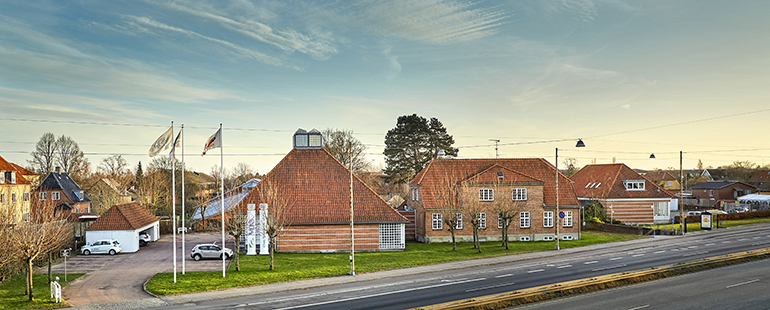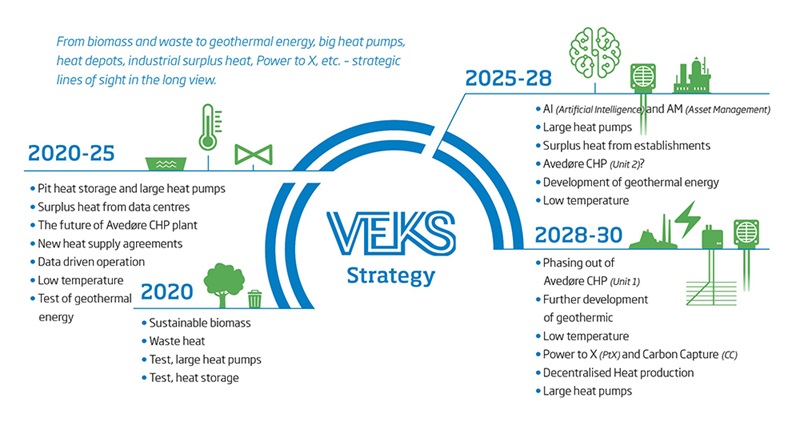
The development of VEKS’ Strategy 2025 is based on the previous Strategy 2020 where vision, mission and 19 strategy projects were realised, and some projects were continued. This time, the task was to a higher degree aimed at adjusting VEKS’ new strategy to the requirements of the surrounding world but also to establish a direction (as this is what strategy is all about) for VEKS’ role in the green transition.
A strategy development course was launched in the autumn of 2019 coincident with the fact that the Executive Board hired an external strategy consultant to facilitate the process. A number of workshops with selected key employees and VEKS’ management group resulted in a presentation for VEKS’ Board which was involved in the process on an ongoing basis by way of strategy seminars and as a permanent item at the ordinary meetings.
The UN’s Sustainable Development Goals
The Board of VEKS expressed a distinct demand that VEKS’ strategy had to take the UN’s Sustainable Development Goals as their starting point when acting as a sustainable enterprise demonstrating social responsibility. The goals open for new possibilities and moreover expresses a common language mas-tered by the population and politicians all over the world.
More specifically, it means that VEKS must speed up the green transition by making sustainable priori-ties signalling climate considerations and social responsibility relative to the customers, potential new employees, and cooperative partners – and the surrounding world of VEKS in general.
Many establishments have faced enormous challenges when complying with the green transition re-quirements and living up to the national goal of reducing the CO2 emissions by 70% in 2030. However, VEKS is privileged to be part of the solution to the large climate challenges which our society is facing (please find more information in Case 4). In its almost 40 years long life, VEKS is facing its most ambi-tious decade, technologically and climate-wise.

The Board of VEKS is updated on an ongoing basis at the Board meetings when it comes to progress in connection with the strategy. In the middle of 2023, a strategy seminar will probably be arranged for the Board where they can discuss progress, partial results, further plans and the need for adjusting VEKS’ Strategy 2025.
Strategic topics
The strategic work is naturally based on a stable, efficient and environmentally sound operation of the heat supply.
VEKS’ strategic development concentrates on strategic topics – formulated as four questions:
- The future green energy system – where does the green heat come from in the future?
- Efficient core operation - how do we utilise the digitalisation for optimisation purposes?
- Green image - how and where can we enhance the position in the green transition debate?
- Cooperation with the customers - how can an ongoing customer focus help ensuring that we keep on being attractive as suppliers to our supply companies?
The future green energy system – where should the green heat come from in the future?
Sustainable energy plays an important central role with VEKS. With the Danish Climate Law in 2019, the government formulated an ambitious goal to reduce the CO2 emissions in Denmark by 70% up to 2030 compared to the level in 1990. The district heating sector plays an important role in this transi-tion.
VEKS’ goal is to supply CO2 neutral district heating in 2025 which is primarily based on the CHP plants’ transition from fossil coal and natural gas to sustainable biomass. At the same time, VEKS searches for potential new surplus heat projects and efficiency improvements, however, also analyses new production technologies which may supplement and replace the biomass over time. This is primarily carried out in the strategic collaborative project “The future district heating supply in the Copenhagen metropolitan area 2050 (FFH50)”. In the spring of 2021, the first conclusions and scenarios will be published which will form the basis of how VEKS will deliver green, safe and effective district heating in the best possible way thus supporting the future green, sustainable energy system.
Efficient core operation - how do we utilise the digitalisation for optimisation purposes?
In the years ahead, VEKS will play an important role when it comes to the fact that the district heating system is to be integrated and operated with greater data performance across the Copenhagen metro-politan area interactively with the district heating companies.
More projects have been introduced to check how to collect and process large amounts of data which by way of algorithms can increase intelligent management and optimisation of operation and maintenance.
Flexibility is becoming of greater and greater value in an energy system with an increasing amount of sustainable energy in the electricity network and new decentralised types of green technologies in the heating system (heat pumps, electric boilers, surplus heat, etc.). It requires that VEKS will be able to analyse and control the operation of the transmission system with greater power and precision.
Therefore, VEKS will take the first steps towards using data intelligently to optimise the control and sur-veillance of the transmission system and to establish a dedicated analytics teams across the establish-ment to ensure the right focus. The work must be prioritised – step by step – by establishing an outline and ensuring sufficient quality of the data applied.
Green image - how and where can we enhance the position in the green transition debate?
Together with the rest of the district heating sector VEKS contributes to informing others about district heating the aim of which is to increase the knowledge of district heating. For instance, it is specified thanks to press and news training together with a revised communication policy and strategy which were adopted by The Board of VEKS in December 2020. The key message is that “District heating is the key to green transition” and VEKS should seek influence within:
• The integrated energy system
• Development and innovation
• Adjustments
Moreover, VEKS wants a clear green, sustainable profile by making demands to our own actions in the daily actions as well as to our suppliers, customers and cooperative partners. More initiatives have been initiated by preparing a catalogue with initiatives which can be realised in the individual departments. Moreover, a CSR policy, an overview of relevant labelling schemes and possible certifications schemes are to be prepared. To act “Green for real” is also about working out a simple environmental and finan-cial model as a decision tool and documentation for the choices we make – to live up to VEKS’ purchas-ing policy.
Cooperation with the customers - how can an ongoing customer focus help ensuring that we keep on being attractive as suppliers to our supply companies?
New heat supply agreements – made between VEKS and the customers – were finished at the end of 2020. The new agreements secure the basis for continuing the green transition and at the same time maintaining the reliability of supply at the lowest possible heating price.
A key element in the new agreements is a model which is motivating the local district heating company to find surplus heat – especially the heat production in the winter period when there is a need for heat. It increases the local co-determination as people also help influencing their local district heating price.
The role of VEKS Customer Forum was also widened upon the establishment of a Planning and Devel-opment Committee which consists of administrative employees from seven companies – large and small – appointed by Customer Forum, apart from VEKS’ Executive Board (for more information please see Case 3).
VEKS contributes to diffusing green, sustainable district heating by supporting the customers in their conversion from fossil heating to green district heating.
In the long view
Just as the rest of the district heating sector, VEKS considers sustainable biomass as a transition fuel. Therefore, VEKS is involved in a number of projects and collaborations on future technologies which may supply the green district heating system in the future. More specifically, projects about large efficient heat pumps, geothermal energy, expanded heat storage, local surplus heat, etc., already exist.
However, the green transition does not stop here. On the long run, the following is being looked into – again in collaboration with other actors: the possibilities of CCS (Carbon Capture and Storage – captur-ing and storing CO2) and surplus heat from PtX (Power to X – production of eco-friendly fuels for the transport sector based on low-cost power production) which could be relevant technologies after 2030. An even longer perspective up to 2050 includes expectations where a large part of the district heating comes from technologies which are not mature, not fully developed or do not even exist today.
Therefore, VEKS keeps considerable focus on introducing and further developing new green sustainable production technologies – preferably local solutions in collaboration with the district heating companies – which can satisfy the requirements to environment, efficiency and economy.